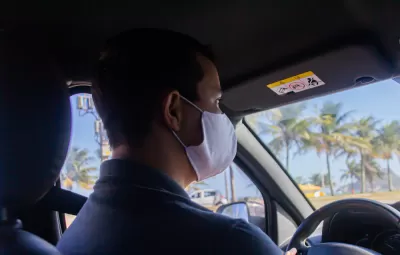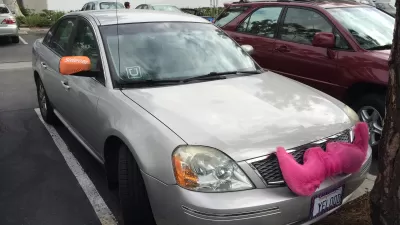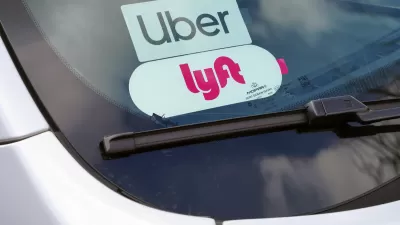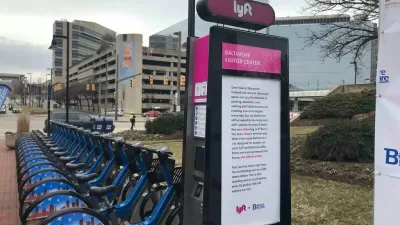With pooled services suspended through the pandemic and research showing most users prefer private rides, will shared rides continue to play a role in urban transportation?

As ride-hailing companies like Uber and Lyft faced backlash for producing more urban congestion with single-passenger trips, "pooled service seemed to offer a more city-friendly product," and autonomous vehicle producers also designed multi-person pods in preparation for a future of shared-ride transit. But with shared services largely on hold since the start of the pandemic, David Zipper, writing in Bloomberg CityLab, asks whether shared transportation can recover.
Back in February 2018, the nonprofit World Resources Institute unveiled the Shared Mobility Principles for Livable Cities, a set of guidelines that "included a commitment that autonomous vehicles would offer only shared trips within urban areas," according to Zipper. Since then, "a slew of evidence suggests that those who can afford to hail a vehicle would really prefer to have it to themselves," which is "worrisome news for public officials who hoped shared rides could help curb congestion — and for mobility companies who’ve pointed to sharing as a reason their products wouldn’t condemn cities to gridlock." While "sharing trips with strangers is the basic principle behind riding public transportation," sharing rides in private vehicles feels different than larger conveyances like trains or buses. "In a bad situation, you’re more likely to feel trapped in a ride-hail vehicle," making some users more reluctant to use shared rides even outside the public health risks posed by the pandemic.
Without policies to incentivize shared travel through increased convenience or lower cost, the dream of autonomous shared transit could devolve into a growing number of "individual AV trips grinding urban streets to a halt."
FULL STORY: Can Shared Mobility Survive the Pandemic?

Maui's Vacation Rental Debate Turns Ugly
Verbal attacks, misinformation campaigns and fistfights plague a high-stakes debate to convert thousands of vacation rentals into long-term housing.

Planetizen Federal Action Tracker
A weekly monitor of how Trump’s orders and actions are impacting planners and planning in America.

In Urban Planning, AI Prompting Could be the New Design Thinking
Creativity has long been key to great urban design. What if we see AI as our new creative partner?

Pedestrian Deaths Drop, Remain Twice as High as in 2009
Fatalities declined by 4 percent in 2024, but the U.S. is still nowhere close to ‘Vision Zero.’

King County Supportive Housing Program Offers Hope for Unhoused Residents
The county is taking a ‘Housing First’ approach that prioritizes getting people into housing, then offering wraparound supportive services.

Researchers Use AI to Get Clearer Picture of US Housing
Analysts are using artificial intelligence to supercharge their research by allowing them to comb through data faster. Though these AI tools can be error prone, they save time and housing researchers are optimistic about the future.
Urban Design for Planners 1: Software Tools
This six-course series explores essential urban design concepts using open source software and equips planners with the tools they need to participate fully in the urban design process.
Planning for Universal Design
Learn the tools for implementing Universal Design in planning regulations.
planning NEXT
Appalachian Highlands Housing Partners
Mpact (founded as Rail~Volution)
City of Camden Redevelopment Agency
City of Astoria
City of Portland
City of Laramie





























